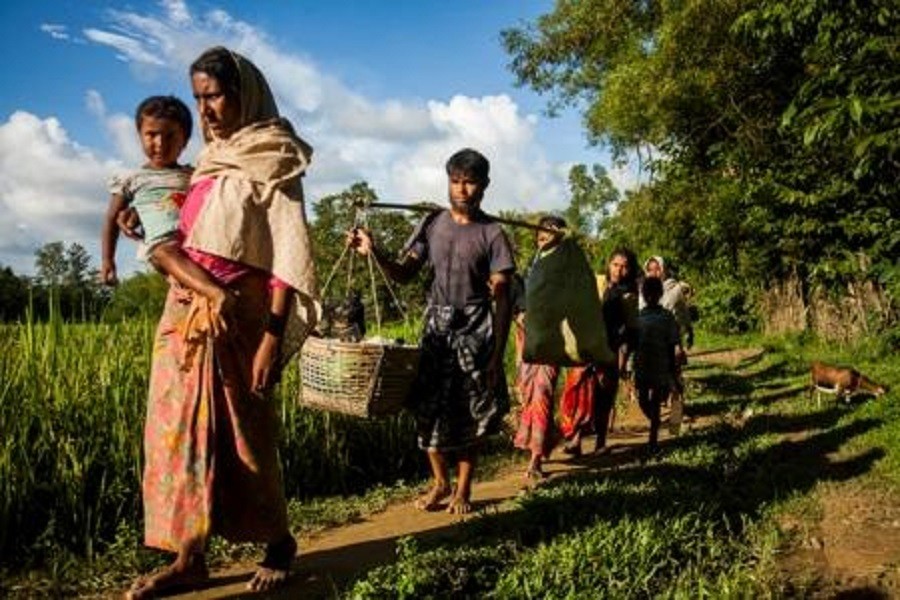Foreign Ministers from Asian and European countries on Monday began two-day talks to strengthen partnership for peace, find joint efforts to achieve Sustainable Development Goals (SDGs) with focus on Rohingya issue.
Though the Rohingya issue is not mentioned specifically in the draft agenda of the 13th Asia-Europe Meeting (ASEM) of Foreign Ministers, this biggest humanitarian crisis of the world will come up in a big way to put further pressure on Myanmar for a solution to it.
A diplomat said regional, international issues, promotion of peace, traditional and non-traditional security challenges will be discussed in the meeting. "So, the Rohingya issue will definitely be there at some point."
The State Counsellor laid emphasis on new and stronger partnership. "Partnership is crucial."
She said partnership not just among governments but it is essential for civil societies and private sector.
Foreign Minister AH Mahmood Ali is leading Bangladesh delegation.
Ahead of ASEM Foreign Ministers' Meeting in Myanmar, Bangladesh tried to make the best use of high-level visits from a number countries, including China and Japan in the last two days -- Saturday and Sunday -- to mount pressure on Myanmar and expedite talks for sending Rohingyas back to their homeland.
After visiting Rohingya camps, the Foreign Ministers on Sunday said they will raise the issue at the ASEM FMs meeting.
"Surely, they all said they now have even a better understanding and will raise it," State Minister for Foreign Affairs M Shahriar Alam told UNB on Sunday.
Bangladesh is expecting louder voice from the international community at the meeting that begins at Myanmar International Convention Centre (MICC) on Monday morning.
State Counsellor and Union Minister of Foreign Affairs Aung San Suu Kyi and European Union High Representative Federica Mogherini, among others, addressed the opening session.
Two youth representatives presented their vision on ASEM process.
The ASEM FMs will lay emphasis on making ASEM partnership more dynamic and connected.
Connectivity across the diverse domains, transport, tourism, climate change, energy security, poverty reduction, people to people contact and cultural cooperation, education, trade and investment cooperation will also be discussed, an official said.
The official said the Rohingya issue might emerge in a big way at the discussion.
The visits of the Foreign Ministers of China, Japan, Germany, Sweden and the European Union High Representative took place on Saturday and Sunday just after a key UN committee has overwhelmingly approved a resolution calling on Myanmar's authorities to end military operations against Rohingya Muslims, ensure their voluntary return from Bangladesh and grant them "full citizenship rights".
"These visits just after the third committee resolution will play a supportive role," State Minister for Foreign Affairs M Shahriar Alam said.
The same visit of the European Union Vice President, he said, will ultimately put pressure on Myanmar to resolve the Rohingya crisis.
"I hope, their role will help expedite our bilateral initiative to send back Rohingyas to their homeland from Bangladesh," said the State Minister.
Earlier, the General Assembly's human rights committee approved the resolution sponsored by the 57-nation Organization of Islamic Cooperation by a vote of 135-10 with 26 abstentions on Thursday.
Those voting ‘no’ included Myanmar's close neighbour, China, as well as Russia, the Philippines, Vietnam and Laos.
The resolution now goes to the 193-member General Assembly for a final vote in December where its approval is virtually certain.
A diplomat who is in touch with the upcoming ASEM Foreign Ministers' meeting told UNB that the joint visit to Bangladesh, including Rohingya camps, before their participation in the ASEM FMs' meeting does put Myanmar on the spotlight for its failure to address the Rohingya issue.
"I can assume that the European leaders are very serious about this issue and they would definitely bring additional pressure on Myanmar authorities for Resolution of the issue," he said wishing to remain unnamed.
The diplomat said they might go for a separate Political Declaration, during the Summit or ask regional players to play a more constructive role in resolving this protracted issue.
Chinese Foreign Minister Wang Yi, who also completed a two-day visit to Bangladesh, before heading for Myanmar however, encouraged Bangladesh to find a bilateral solution in which China is willing to facilitate with neutrality.
When Bangladesh is seeking genuine efforts from Myanmar to resolve the Rohingya crisis with a growing international pressure on it on the issue, Myanmar’s Union Minister for Information Dr Pe Myint has laid emphasis on maintaining good relations as neighbours.
“It’s necessary... it’s essential... we’re neighbours. We must have good relations,” he told UNB adding that his country is willing to cooperate with Bangladesh in all aspects.
The Asia–Europe Meeting (ASEM) is an Asian–European political dialogue forum to enhance relations and various forms of cooperation between its partners.


